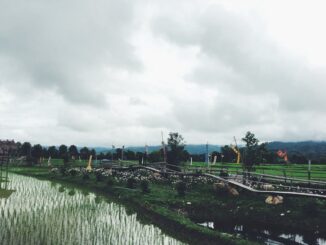
The Community named Uegwere Boue is located in the Khana Local Government Area of Rivers State. They are part of a well known tribe called Ogoni. According to oral tradition, the Ogoni people migrated from ancient Ghana down to the Atlantic coast eventually making their way over to the eastern Niger Delta. Linguistic calculations done by Kay Williams place the Ogoni in the Niger Delta since before 15 BC, making them one of the oldest settlers in the eastern Niger Delta region. Radiocarbon dating taken from sites around Ogoniland and the neighbouring communities’ oral traditions also support this claim. They are one of the few tribes that survived the period of slave trade because they lived in relative isolation and did not lose any of their members to enslavement. After Nigeria was colonized by the British in 1885, British soldiers arrived in Ogoni by 1901. Major resistance to their presence continued through 1914.
Some historians have identified some notable similarities between the Ogonis and the Volta people of Ghana. The method of farming of yam and cassava in the Volta region of Ghana is the same with the Ogonis. And the two crops are their chief crops. There are several villages and communities whose names are the same in both tribes, example Elelme, Kpone and Bakpo. Also, alphabets and pronunciation of some Volta people and those of the Ogoni people are the same.
Uegwere Boue is one of the towns in Boue Community which comprises of ten villages. There is no clear or specific date of her origin but some historians believe that Uegwere existed in the times of the Homo-Erectus Stone Age. According to oral tradition, Uegwere Boue was founded by three brothers named; Gbene-kiri, Gbene-ka-bien and Bie. The three great forefathers of the community settled first in a community named Kpong and later moved to a place called Luawii. Other historians stated that they also moved to Bara-Boue. The migration of these brothers was basically because of the search for economic trees (hardwood) that will be used to produce masks, household utensils, doors, etc. Another reason for their constant migration was the quest to discover fertile land for planting, since they were also farmers.
It is said that Gbene-ka-bien in one of his numerous exploration discovered a land that was rich in hardwood. Thrilled by the viability of the land, he started clearing a part of the land immediately. To show the selfless nature of Gbene-ka-bien, he went back to Luawii to enlighten his brothers of his great discovery. Historical data differs on which of the brothers that first joined Gbene-ka-bien. Some historians argue that it was Gbene-kiri, while others claim that Bie was the first that followed their brother. However, the three brothers moved to the new founded land which they named Uegwere, derived from “gwere” (a solid hardwood). Thus Uegwere means the land of hardwood. Gbene-ka-bien cleared, cultivated and inhabited in a part of Uegewere where he named Ee-yor-bia. And Gbene-kiri founded more villages which include; Si-yormii, Eegwere, Nor-maa, Kee-dara-karabe and the land the Community Secondary School occupies. While, Bie who was said to be young, strong and vibrant cleared from Kuruga to Ee-lor-lor, which is the largest land in Uegwere. They lived in peace and harmony with their families, there was no trace of internal crisis or war.
Other notable descendants of these three great ancestors are Gbenekwo, Gbene-Nyonwa, Gbenetigira,Gbenelaga,Gboe, and others. The families of Gbene-kiri, Gbene-ka-bien and Bie are the foundation and most important house of Uegwere Boue. These families must be represented in any important event in the community to make such occasion legitimate.
Like many people on the Guinea coast, the Ogoni have an internal political structure subject to community by community arrangement, including appointment of chiefs and community development bodies, some recognized by government and others not. Uegwere Community call their ruler “Mene-bue”, and the system of government was confederal democracy. The first ruler of the community was Gbene-Bara-Kenam. He ruled for many years before his wife’s death during child birth forced him to shift the throne to a non-indigene called Tor-bue. Gbene-Bara-Kenam wanted to focus on his young child and no longer had the zeal to rule Uegwere Boue. After the reign of Tor-Bue, Mene-Bue Koobee Asoo ascended the throne. It was said that he was a great warrior who escaped from Gwara after several attempts was made to assassinate him. He ran to Uegwere where he naturalised. After the death of the great Chief Asoo, Ikpaa became the Mene-Bue. The current ruler of Uegwere is Chief Te-ep Friday Koobee the son of Chief Ikpaa.
Traditionally, the Ogoni are agricultural, also known for livestock herding, fishing, salt and palm oil cultivation and trade. The pride of every young man in Uegwere lies in his strength and agricultural skills. Parents usually advised or sometimes pursued their daughter to marry hardworking farmers because they believe that diligent men will take good care of their daughters. The community produces yam, cassava, fish, palm wine fruits and assorted vegetables in large quantity. Before the introduction of money as means of exchange, the people where fully engaged in trade by barter. They exchange their local produce for other scarce products with other neighbouring communities.
Culturally, the people of Uegwere Boue are rich. She is loaded with cultural festivals which include masquerading and dance. The “tee-bee” masquerade display is a scene to behold, while the prestigious “Jimpie” masquerade display which comes up once in four years is a first class tourist attraction. The community also boasts of interesting and delicious delicacies which includes “beeteh and akpoyaaee. Uegwere Bouerians speak the Ogoni language as its dominant lingual Franca.
Before the advent of colonialism and missionary activities the people of Uegwere Boue were Pagans. She had some dreaded oracles like “Amanikpo”, which served as their deity and chief judge. Anyone accused of major offences are taken to the oracle for judgement. Some historians perceived that like most African tribe, there are traces of killing of twins, human and animal sacrifice, secret societies and cannibalism in the olden times of this community. Currently, Christianity is the most dominant religion. Although there still traditional worshippers but their population is insignificant compared to the number of Christians. Uegwere Boue accommodates almost all the church denominations in Nigeria.
In summary, Uegwere Boue is one of the oldest communities in Ogoniland. She has a democratic government settings void of discrimination and tribalism. The community is self sustaining with her skilled and diligent farmers, hunters and fishermen. Christianity is the dominant religion of the community and the rich cultural heritage of Uegwere is second to none.
Unless otherwise stated, PONIREVO and/or its licensors DO NOT own any intellectual property rights in the website and material on the website. Majority of the site’s content has been scraped and auto posted by a third party artificial intelligence program —– PONIREVO Creation Team.
Proudly WWW.PONIREVO.COM



